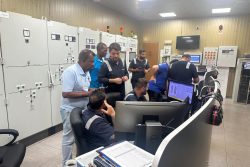Dear Editor,
Segments of the international community, once looked upon as rescuers, have lost some credibility. It took me a while to reach this point, as I had favoured the community with possessing the standards, and the discipline that accompany such, to conduct itself appropriately. I cannot continue to do so, since I recognize that it has overreached, prompting a rethinking of the limits of its role, as well as its objectivity.
I always thought that any international observer mission is, in sum and scale, limited to being just that, and no more. It is a very fine line, one which I detect that the community of watchers has breached by the continual expanding of its footprints on the ground, through an ever-increasing shadow of its presence. It has proceeded from observer to commentator and contributor, from passive observer active participator. This is neither its place nor role, as I see it and think it should be.
It has an obligation to call issues as it sees relative to the actual voting process, the counting process, and the reporting process. It recommends remedial steps, and goes its way, with the rest left to the host nation. Jimmy Carter himself did this in Panama: he watched, he cajoled, he pushed. He warned that an unacceptable result would be so declared by him and his team. I find that commendable. Twist resistant arms behind the scenes, but do not make public speeches pronouncing one way or another, relative to who is gaming (rigging) the system. Not when we are reminded that elections in Guyana have no angels. Repeat: none.
It is why I believe that the OAS has exceeded its role. The OAS has done so by aggressively and provocatively seizing the disputed territory of active, hence suspected, participant. When the OAS speaks of potentially barring certain Guyanese nationals from the recount process because of perceived bias, then it could be argued that it is comfortable wearing that mantle (biased conclusion), while dispensing with what is the more traditional and restraining role of an observer. Calls for barring opens the door to all manner of conjecture as to its motives. Because in Guyana, bias is now automatically attached, even where there may be none. None is looked upon as neutral, even honest
In the middle of the ferocious battling, the referees and mediators are calling for the disqualification of a competitor, or his corners. That may work tidily in a boxing match, but not in an electoral contest with the wantonness and meanness seen here. It is not helpful; adds incendiary fuel to the fires. It is sabotaging to the believed noble work being done, undermining of Guyana’s current political calm. Observers must be wise.
I would be remiss if I did not recognize and appreciate (again) the standard set by the Hon. Mia Mottley, a woman of rare texture. She spoke up, stepped down, then moved out. To speak to credibility, the international community must itself be credible, as to objectives and related underpinnings. The greatest care must be manifested by the international observer missions to remain above the local frays, if only to maintain the aura of immaculate neutrality. It must observe. Analyze and assess. Recommend and report. It should not provide running commentary, it must not be up to its elbows and eyeballs in the slickness of elections Guyana, for then its neutrality becomes strained. I say this for a reason: if and when the observer community become so granularly enmeshed in Guyana’s elections, then it cannot help becoming part of the problem. There is no way for it to escape being evaluated as defiled; this is the nature of the terrain. And if it is observed and concluded to be so inseparably part of the problem then it cannot be part of any solution. The observers are guilty of being too involved, too poisoned by the toxic atmosphere to stick to their knitting. Instead of being conciliators, observers have transformed into arbitrators and jurors. That is not their place, their role. The interminable and raucous disputes of Elections 2020 have been embraced so closely by international observers that the recommended distance of arm’s length introspection, and its attendant benefits, has been diluted and now lost.
Having said all of the above, I want to see this thing done right, but it has to be done by us. I desire for it to be decided by us, and not by anyone else, especially outsiders. They can help, they can urge. But they must never appear to be taking sides. They must be just like the peacemaker in a vicious domestic dispute: never appear to take sides, for then they have no value.
Yours faithfully,
GHK Lall





